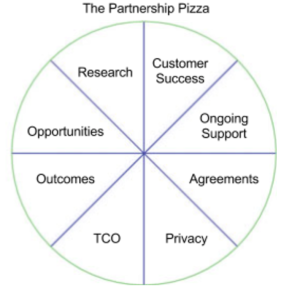We’ve all been there before. Running out to pick up pizza for a school party or to keep people energized as they work long hours. I can’t begin to count the number of pizzas that I’ve purchased in my career as an educator for events like yearbook work sessions and after-school department meetings. And let’s be real. Pizza is easy. It’s cheap. No plates are needed and most people are happy to grab a slice and get back to work.
But the easy way isn’t always the best way. I recall returning to work from a conference a few years ago. There was cold, leftover pizza in the workroom refrigerator. I asked about the pizza and discovered that it was delivered to me from a business partner. Days old pizza is not so good. The partner didn’t think beyond the easy way to determine what might be a better method to show appreciation for our team.
This discussion with colleagues about pizza led to a conversation about partnerships and the importance of engaging with partners in a meaningful way. Partnerships are a two-way street, and I hope that schools as well as organizations that partner with schools will benefit from this post. Partnerships cover a wide spectrum from a classroom teacher connecting with a business partner for mentoring to a school district engaging with a partner for a variety of services including consulting, professional development, or products. With so many businesses and organizations offering services, we must be careful to engage with the right partners. We don’t have money or time for everything and can’t afford to be burned by failing initiatives.
Here is my eight slice pizza with tips to guide you as you engage with partner organizations and businesses:

- Research – Do your background research by looking at credible sources and calling other schools that have used the product or service. Talk with people beyond those who are recommended by the potential partner. Testimonials on a website are great but they don’t tell the whole story.
- Customer Success – Does the organization or business have a customer success representative who is assigned to work with you? Organizations that don’t invest in someone to make others successful are setting themselves up for failure. I recall a recent conversation when I called a customer service center about repairs needed to my home Internet access. I was very frustrated with the response time but the support person on the phone with me never once got mad. He continued to talk calmly and worked with me on a solution. If your organization is receiving services from an business and you provide feedback, they should welcome feedback and work with you on solving the problem.
- Ongoing Support – The beginning of a partnership is a lot like a honeymoon. You and the partner will spend a lot of time together and you get used to this support. What happens after the honeymoon? The partner will move on to find new clients. Will they continue to check in with you and provide ongoing support? Will the cost go up over time? Ask support questions before you enter into an agreement.
- Agreements – Is there a partnership agreement that clearly spells out what services or products you’ll receive? If you’re receiving a discount on a software product, what are the expectations from you in return? If a partnership fails, what are the loose ends that you’ll be left to tie up? How will the partner help you with the transition beyond the awkward breakup?
- Privacy – If you’re using an online platform provided by the partner, are there clearly defined privacy statements about ownership of data and how that data will be used? In the age of analytics, all businesses are collecting data about customers. Take some time to discuss the privacy policy with others and include your attorney if there are questions about the policy. If the partnership ends, does the business still have access to your student or teacher data and can they continue to use that data?
- Total Cost of Ownership – Beyond financial costs, what is the cost that your school will pay for implementing a product or service? How many hours will people devote to the project and is it sustainable in the long run? Ask what it’s worth to you and always be clear with the partner about your goals for the partnership.
- Outcomes – What is your vision for the partnership? Doe your definition of success align with that of the partner? Metrics and funding are important, but the bottom line is that you achieve the desired outcomes for your partnership.
- Opportunities – Most important, what opportunities will be opened up for your school and the teachers and students who engage with the partner? Will the product or service benefit your organization? Will professional development and consulting services empower participants with skills and tools to improve learning?
Good partnerships are about telling each other’s stories, celebrating successes, and supporting each other when things aren’t going well. Our success as a customer means their success as a partner organization. Let’s go beyond the pizza party to form partnerships that bring value to students and teachers in our schools.